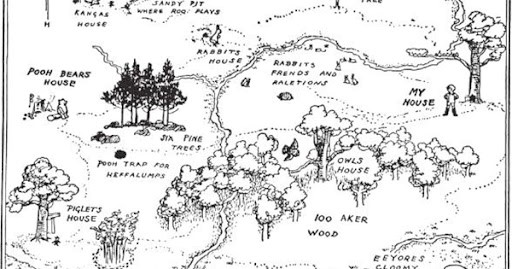
PUTTING FICTION ON THE MAP
If
there is one thing I am even more of a fan of than a children’s book, it is a
children’s book with a map in it. I love nothing more than coming across one in
the story I’m reading, but why are they so useful? Well if a picture tells a
thousand words, then a map must tell a million! Much like novels themselves,
maps tell stories too, so when employed within a book it is a way to go beyond
the words themselves. Not only do they provide us with further supplementary
information to complement the story, but, maps also have the potential to
provide gateways to the imaginary lands, drawing you into the adventure. Think
of Robert Louis Stevenson’s wonderfully inked map which adorns his Treasure
Island, (one of the first maps to be introduced into novels for children and
young adults.) One examination of this just makes you want to join Jim Hawkins
on his search for buried treasure. A map can also serve to bring to life
stomping grounds of the different inhabitants of an imaginary location. By
showing us the shape of the land they build on our imagination, encouraging us
to go beyond the words themselves and inviting us into these fictional lands
presented right before our eyes. One of my favourites has to be that of Ernest
Shepard’s ‘collaboration’ with Christopher Robin of the Hundred Acre Wood. The
Hundred Acre Wood is also an example of where authors use the world around them
for inspiration, being based on the actual Five Hundred Acre Wood in Ashdown
Forest, showing the unique ability of maps to tie both the real and the
imaginary together.
Book maps also have the potential to shape the actions of characters and can
even be essential to the story itself. Think of Marauder’s Map in the Harry
Potter series- where would our favourite characters be had they not been able
to take advantage of this useful tool? In this way maps can artfully be used to
aid plot and characters as well as help the reader.
And sometimes a map just makes the book more beautiful to look at such as the
lovely vintage map of Paris covering the end pages of Adele & Simon by
Barbara McClintock.
Whether the cartography is an imaginary realm or 1907 Paris, I can pour over
them for hours, inserting myself into the tantalizing topography and getting
lost in their world… Quite simply, maps in books are wonderful things – they
take us to new worlds, illustrate exciting journeys and help us to join the
characters wherever they may be. What are some of your favourite book maps to
get lost in and why?
Post Views : 361